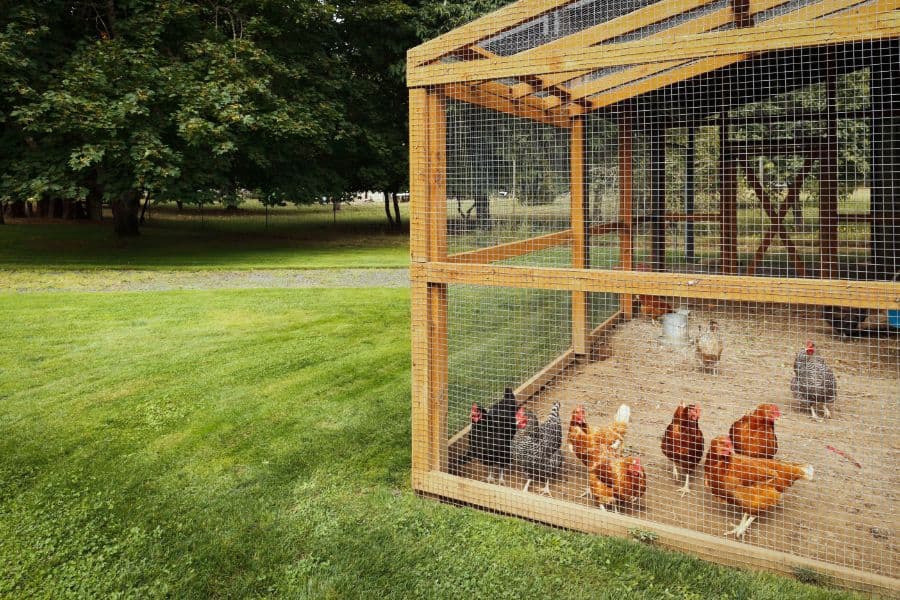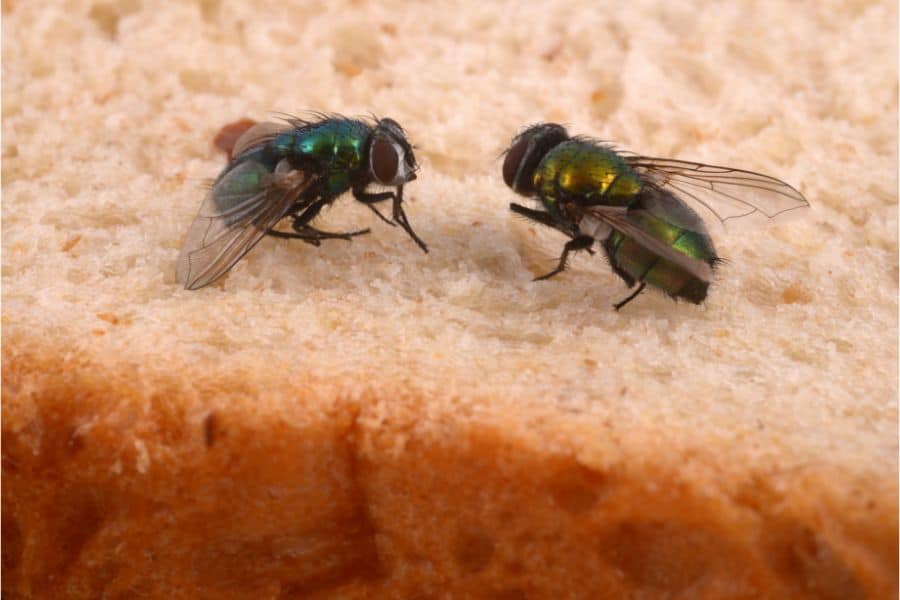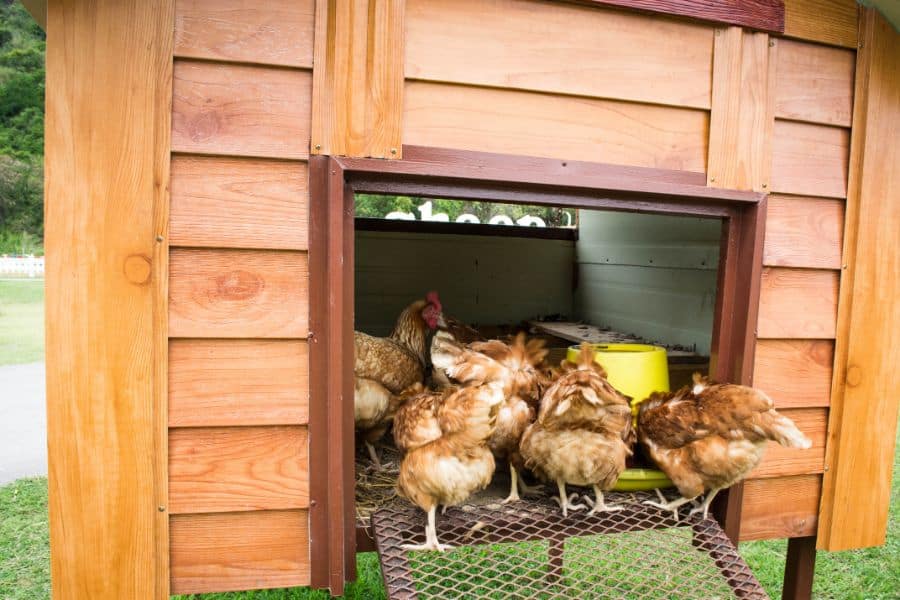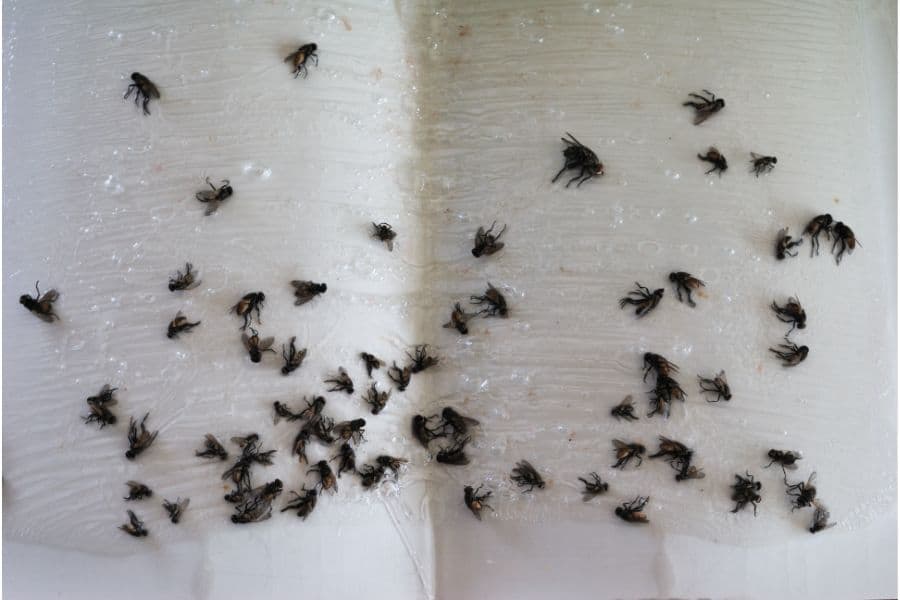The key to keeping flies out of the chicken coop is to create an unconducive environment where flies cannot find food to eat or a place to breed. By using a number of preventative measures, you can forever ensure that your chicken coop stays in a fly-free zone.
However, prevention is not a cure, and sometimes that is what you need. Control measures such as using fly predators, homemade fly sprays, and Diatomaceous Earth have been found to be very effective at destroying flies in chicken coops.
Read on to dive into the specifics of these measures and learn what methods will best suit your specific flock.
Is It Normal To Have Flies In Chicken Coop?
Many chicken farmers and poulters have gotten used to the presence of flies around their chicken coops. To some, it is just a nuisance and inconvenience that usually happens and does not really seem to warrant a big concern.
But is that really true? And should you even care?
As normal and common as it is to have flies in the chicken coop, it is definitely not comfortable nor healthy for your chickens. Flies compromise the overall health of your chickens and the hygiene of the coop by:
- Transmitting diseases – Even though the health risks are low, flies can transmit pathogens & bacteria, leading to various health issues among your flock, including Salmonella.
- Fly strikes – this is the most common affliction on chickens where flies lay eggs on a chicken, typically in damp or soiled areas of their body. These eggs hatch into maggots, which then feed on the chicken’s flesh, causing significant distress and potential health issues.
- Fly pecks – Flies can spot the eggs, thereby reducing the produce by destroying good eggs. The destroyed eggs add to the moisture, dirt, and decaying organic matter in the coop.
Why Are Flies Attracted To Chicken Coop?
The main reason why flies are attracted to the chicken coop is due to the presence of decaying organic filth like chicken poop and feed spillage.
Once the flies are attracted to your chicken coop by the smell and source of food, they will start to feed and reproduce, and this is where moisture issues come in.
Lots of moisture, wetness, wet bedding, wet feed, and water puddles are conducive for flies since they offer breeding grounds where they can lay their eggs. Moisture also hydrates flies and ensures their population thrives.
Apart from wetness & dampness, flies are also attracted to the chicken coop because of poor cleanliness and improper management. If the coop is filled with droppings, dirt, leftover food scraps, and poorly managed compost piles, then the flies will have more food and congest the coop.
Warmer summer conditions are also optimal for creating a fly infestation. Flies, like other insects, depend on warmer conditions to breed.
Higher temperatures mean flies populate chicken coops faster – going through a complete metamorphosis in under 7 – 10 days instead of up to 2 months in colder conditions. This explains why flies are more common in hotter climates and tropical regions.
Chickens pooping all the time, a wet & damp coop, high temperatures, warm & wet months, wet feed, and water puddles; all of these are recipes for creating the perfect environment for flies to thrive in.
You will solve 100% of flies in chicken coop problems if you create an unconducive environment for flies to thrive in. This starts with efficient preventive & maintenance solutions that keep your chicken coop dry and clean.
Depending on what region you are in, the types of flies might vary. The good news is that all go through the same development stages, and therefore flies can be managed with the same methods.
The best way to get rid of flies in chicken coops is to employ several fly control strategies. In that case, fly control chicken coop takes two steps: Preventive Measures and Control Measures.
5 Prevention Measures To Keep Flies Away From Chicken Coop
All of these are steps that prevent the flies from getting into your chicken coop in the first place.
1. Maintaining Cleanliness
Regularly remove the chicken poop and soiled bedding from the coop to eliminate buildup that can create a breeding ground for flies. A good strategy is to use a heavy cleaner like vinegar every month to scrap down all the dirt spotlessly.
Another cleaning measure is to get rid of all food scraps that may be spread on the ground from spillage. By minimizing organic matter, you can significantly reduce the fly population.
Also, ensure that feed and water are stored in well-secured containers to avoid any spillage. You do not want water puddles and muddy accumulations that can act as breeding grounds.
2. Fresh Food Only
Only use fresh food as chicken feed.
Decaying foods left in the coop contains lots of bacteria and moisture that are conducive to hosting and attracting flies. You can also go further and avoid feeding the chickens feeds past their best dates.
Flies like the common fruit flies are attracted to overripe produce and fruits or veggies left lying around. Ensuring that no overripe or decaying food is left lying around will go a long way to not creating a habitable place for flies to come looking for food.
3. Remove Food From the Coop
Chickens only eat until they are full. If there is any food left inside the coop at the end of the day, it is best to remove all of it since chickens do not eat at night.
Only bring out the food during the day at feeding times, and any excess should be placed out of sight to avoid food decay, moisture buildup, and dirtying up the coop.
You can opt for an automatic feeder or secure bins to make removing leftover food a much easier process.
4. Window Screens
With a well-maintained chicken coop, you should consider installing a window screen on the doors, windows, and other openings in the coop. It helps reduce the number of possible entrances the flies can use.
This will not prevent flies from getting into the coop via a hitchhike on the backs of chickens or in their muddy feet, but it will minimize the chances of rapidly developing an infestation.
5. Air Flow
You should consider constant airflow if you have electricity in your coop. A simple solution like using a small fan can create a constant air breeze that ensures there is never still air in the entire coop.
Air currents deter pests like flies since they prevent the little infestations from landing on any surfaces or holding onto their grip.
It is only 80% effective for flies since you can only move air at low speeds before the currents start to discomfort the chickens. Some flies may also persist in dead zones where the air current might not sweep them off.
10 Control Measures To Keep Flies Away From Chicken Coop
Control measures are ones you consider after trying to prevent the flies from calling the coop their home. They should come after preventative measures for the best outcome.
This is where you start considering the home remedies for chicken flies as well as commercially available solutions, including fly traps, organic measures like employing fly predators, and using chemical control methods.
1. Homemade Fly Spray
If you are wondering what home remedies are best for chicken flies, then homemade fly spray is your best pick.
A Homemade Fly Spray for chicken coop can be made using vinegar and essential oils (lemon, eucalyptus, mint, and lavender) since the combo acts as a repellant that keeps flies at bay.
The strong scent of vinegar & essential oils will be efficient at chasing away flies for a while, but it is not the most effective solution since it’s short-term, and you will have to spray every day continuously.
To make the spray, combine equal parts of water and vinegar in a spray bottle and add a few drops of essential oils. Shake well and spray the mixture in and around the coop, focusing on areas where flies tend to gather.
2. Apple Cider Vinegar
Vinegar, like Apple Cider Vinegar, can also do the job on its own without essential oils. It has a strong scent that repels insects like flies and also serves as a good cleaning agent for the coop.
Pour some Apple Cider Vinegar on the floor and also use it to clean the chicken coop thoroughly.
3. Herbs
Planting or hanging fresh herbs in and around the chicken coop also acts as deterrence due to their strong scents. Some good examples include:
- Mint
- Lemongrass
- Lavender
- Rosemary
- Basil
- Bay
- Thyme
- Oregano
4. Diatomaceous Earth – DE (Food-Grade)
Diatomaceous earth is a natural control remedy for flies in chicken coops. DE is composed of fossilized remains of diatoms, microscopic abrasive algae that can absorb fats and oils from the exoskeleton of flies, causing them to dehydrate and die.
This is a good control solution for feed spillages on the ground. If you leave the feed on the ground for the chickens, then sprinkling Diatomaceous Earth will help. You can also apply a thin layer to areas prone to fly activity, like bedding and poop piles.
An important factor in using DE is that you need to ensure you only use food-grade DE. Other forms of DE, like the ones used in pools, can be harmful to chickens due to their toxic compound compositions.
5. Predator Plants
Predator plants like the carnivorous Venus fly trap and Butterwort feed on flies in sorts of settings, including inside chicken coops. Please keep in mind that these plants usually feed on a handful of insects in a week; hence won’t be a good solution if used alone.
6. Fly Strips
Fly Strips or Sticky Fly Papers are sheets of material with a sticky glue-like ingredient where flies can get stuck.
As simple as the idea, cost, and implementation, hanging these fly strips has proven to be one of the least effective methods for many users. However, when used in combination with other methods like a homemade fly spray, the two can be quite effective.
Keep in mind that chickens sometimes get tangled in the fly strips, making them a hazard depending on where you place them.
7. Fly Traps
Fly Traps come in many shapes and forms. They all work by attracting flies using products like specific fly-enticing scents. Once the flies are lured, a trap contraption on the fly trap captures and keeps the flies from escaping.
Although fly traps are incredibly effective, some farmers do not like them. This is because even though the smells are enticing to flies and unnoticeable to chickens, they are noticeably stinky and nasty to humans.
Only buy if you have flies. Fly traps work by attracting existing flies. If your coop is fly-free, the fly trap will attract some from nearby and cause you to then have a fly problem.
Also, ensure to situation it outside the coop because you want to attract the flies off the chicken coop. However, do not place it far from where flies can smell the scent; others won’t be attracted and trapped.
8. Vanilla Air Freshener
Many chicken farmers have attested to the efficiency of these small car air fresheners. They are cheap to get and work on the same principle of deterring flies by having repellent smells from the herbs and scents used in their making.
9. Fly Predators
Fly predators are tiny parasitic wasps that target fly larvae. These beneficial insects lay their eggs near fly breeding sites, and when the eggs hatch, the predators consume the fly larvae, thus reducing the fly population.
The use of predators has been an effective fly control measure in many horse barns for decades, making it the perfect biological fly control measure in chicken coops. They are also cheap to get at about $28.85 per 7,500 pupae.
It works best if you get the fly predators into the coop before the fly season starts.
A downside to using fly predators is the fact that chickens love feasting on them. You may have to buy lots of fly predators and feed your chickens properly to deter them from eating off your fly solution.
10. Chemical Control Methods
If you are environmentally aware and concerned, then using chemicals is out of the question.
Residual insecticide sprays are the most common chemicals used to kill flies. Even though they are extremely effective, it is important to note that they can also kill beneficial animals, including insects like bees.
Remember that chickens peck everything and on anything in the coop. You do not want toxic chemicals close to your flock or yourself since it can lead to fatal conditions.
Also Read:
Frequently Asked Questions
Do Chickens Eat Flies?
Chickens can eat flies, by sadly, they rarely do. Flies in chicken coops would be a strange occurrence if chickens fed on flies daily.
The reason why they rarely eat flies is because they cannot move fast enough to catch flies. You might see your flock try eating them occasionally, but the chase is usually futile. Also, if your chickens are well-fed, they won’t have the inclination to go out of their way to eat flies.
How Do You Prevent Fly Strikes in Chickens?
The best way to prevent fly strikes in chickens is to prevent and control the fly population in your coop. If your coop is already infested & numbers keep growing, it is only a matter of time before your chickens suffer from the fly strikes.
Are Your Neighbors’ Chickens Causing Flies?
If you have taken all the preventative and control measures to keep flies away from your coop, then consider other causes, including looking at your neighbor’s chickens.
It’s important to address the issue sensitively by having a friendly conversation and explaining the concerns and potential health risks posed to your chickens. Collaborate on implementing fly control measures that benefit both flocks, such as proper waste management and cleanliness practices.
Also, if you own a fly-infested chicken coop, then you may want to solve the problem to avoid neighbors noticing. It can be embarrassing but will also invite many complaints and concerns from their side.
Conclusion
Flies are a significant nuisance, uncomfortable coop mates, and pose health risks to your chickens. You can create a 100% fly-free environment for your chickens with proper fly control and preventative measures.
Remember to always start with maintaining a clean and dry coop, preventing moisture & organic matter buildup, and only then should you follow up with more extreme control measures like chemical control.
By following these steps, you can effectively reduce the fly population in a matter of days or, at most, weeks, depending on the severity of the infestation.




